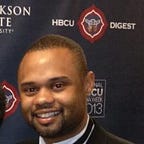Black Journalists, Can We Please Stop Putting HBCUs Back in the 1860's?
Benjamin Mays ain’t walking through the door.
North Carolina Central University just received $1.5 million from the National Institutes of Health to develop a drug that may reverse negative health effects associated with obesity.
Tuskegee University received a $1 million grant to help black secondary students throughout Alabama’s Black Belt to gain access to computer science training.
Langston University is partnering with a local school district in Oklahoma City to offer baccalaureate and advanced degrees to working professionals in the metropolitan area.
A former gang member turns his life around and enrolls in Wiley College. Today, he’s one of the youngest vice-principals in the history of Houston’s public school districts.
HBCUs are saving and improving lives. Yet all we can talk about — we, as in black reporters, editors and advocates — are the non-penetrating, non-revenue bearing, obsolete notions of what HBCUs used to be, who they used to serve and why that should resonate with us today.
Fighting Stereotypes
You can usually tell when a think piece on the value of HBCUs is about go sideways when it talks about the negative reactions to HBCUs and HBCU culture.
It’s terrific for clickbait and dramatically low on statistics that explain how black folks are healthier, wealthier and more politically empowered because of black colleges. It is woefully devoid of key bits of information, like HBCUs having their highest collective enrollment in history in 2011, and that five years later, even after attempts by the Obama Administration to kill HBCUs, the numbers are again trending upward.
But we fall prey to the common discussion on what black folks don’t understand about HBCUs, and how we perpetuate harmful myths about them. From a content perspective — is it better to list and address negative feelings about black colleges, or to contextualize the negativity within appropriate frames of economics, racism, and political voodoo?
Back To The Future
For as much as everyone in the HBCU community insists on the need to tell our story, we focus on the exact wrong approaches about to attract today’s students.
Eddie Robinson can’t help today’s players get to the NFL. The pageantry of homecoming doesn’t help anyone get a job or pay back student loans after graduation. Nurturing environments and family-oriented campuses does not help a campus to enroll 3,000–10,000 students — the magic number most experts believe schools must reach and maintain to stay alive in the 21st century.
We’re eagerly awaiting the debut of a documentary which will talk about HBCU history, but the symposium which puts that history in contemporary context remains largely off the radar of most administrators, faculty and alumni.
History and Higher Education Don’t Mix. Especially For Black People
The truth is that everyone who should, or needs to know understands full well the rich history of HBCUs. And those people who most appreciate it, understand that it does virtually nothing to help convince most high school seniors of why an HBCU is a better choice than a predominantly white institution, or why a donation is better given to a black college than a black church or a black fraternity or sorority.
Every college in this country has a rich history, some of them, including some HBCUs, were instrumental in the establishment of the United States as a world power driven by industrial innovation and democracy.
But only HBCU communities are hindered by this collective black-and-white photograph view of our value, and while everyone else is talking about how higher education will survive new eras of technology, innovation and industry, our journalists are allowing the yearning for HBCU nostalgia to drive our effort to tell a more robust story, to more effectively plead the case for black colleges in the public space.
Black history matters, but not more than black futures.
*And here’s the part where I use a decades-old quote from a long-deceased HBCU president to drive home the point of contemporary value of black colleges.*
We, today, stand on the shoulders of our predecessors who have gone before us. We, as their successors, must catch the torch of freedom and liberty passed on to us by our ancestors. We cannot lose in this battle. — Benjamin E. Mays
